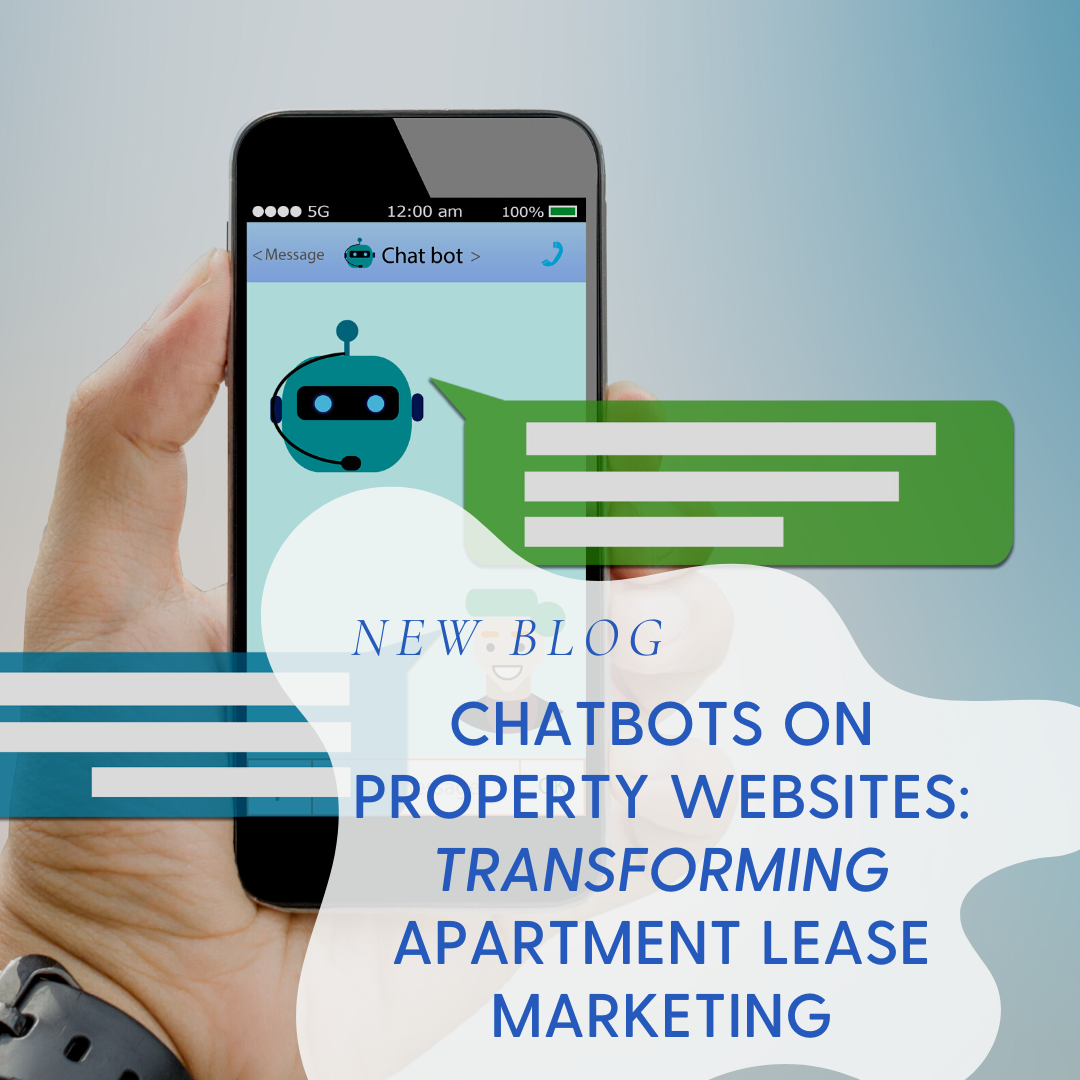
Discover the role of chatbots in apartment marketing and how they can transform your leasing communication! In today’s rapidly evolving digital landscape, technology continues to reshape industries across the board, and the multifamily sector is no exception. One of the most prominent advancements in recent times is the integration of chatbots into apartment websites.
Integrating an apartment chatbot into the leasing process not only enhances user engagement but also streamlines inquiry handling, transforming the way potential tenants interact with property websites These AI-powered virtual assistants are proving to be invaluable tools for property managers and real estate agents, enhancing customer experiences, streamlining communication, and ultimately driving conversions in the competitive apartment rental market.
A robust management system that incorporates AI and machine learning can predict tenant behavior, optimize pricing strategies, and provide insights that are crucial for property managers to stay ahead in the competitive market. The right chatbot will correctly integrate your property brand and also be an extension of your leasing team. As technology continues to progress forward every week, it’s essential to continue to integrate easier ways for your future prospects to communicate.
How To Start Using Chatbots For Your Apartment Marketing
The use of artificial intelligence in chatbots represents a revolutionary shift in apartment leasing, offering potential tenants a responsive and intuitive interface that mimics human conversation. The integration of a multifamily chatbot into the leasing process not only streamlines inquiries but also personalizes the experience for potential tenants, offering real-time responses tailored to individual needs. Setting up a chatbot to generate leads involves careful planning, design, and integration. Here’s a step-by-step guide to help you create an effective lead-generating chatbot:
- Define Your Goals: Determine what specific goals you want your apartment leasing chatbot to achieve. Do you want to collect contact information, qualify leads, schedule tours, or provide personalized recommendations? Clearly outlining your goals will guide the design and functionality of your chatbot.
- Identify User Scenarios: Map out potential user interactions and scenarios. Think about the questions users might ask, the information they’re seeking, and the actions you want them to take. This could include asking about available units, amenities, pricing, and more.
- Design Conversational Flows: Create conversational flows that guide users through interactions. Break down the dialogue into decision trees, where the bot responds based on user inputs. Design a friendly and natural conversation that simulates human interactions.
- Integrate Lead Capture Forms: Incorporate lead capture forms into the chatbot’s flow. These forms should gather essential information from users, such as their name, email address, phone number, budget, and preferences. Keep the form as concise as possible to encourage completion.
- Provide Value: Offer users valuable information throughout the conversation. Share details about available properties, amenities, neighborhood highlights, and any special offers. By providing value, you build trust and encourage users to share their information.
- Implement Lead Qualification: Use branching logic in your chatbot to qualify leads. Ask questions that help you understand the user’s needs, timeline, and preferences. This information will help you segment leads and prioritize follow-up.
- Enable Personalization: Leverage user data to provide personalized recommendations. If the user is interested in pet-friendly apartments, for example, ensure the chatbot showcases relevant options. Personalization increases engagement and user satisfaction.
- Include Clear Calls to Action: Guide users toward specific actions, such as scheduling a tour, signing up for a newsletter, or requesting more information. Use persuasive language and clear calls to action to encourage these actions.
- Test and Optimize: Launch your chatbot and closely monitor its performance. Collect data on user interactions, lead conversions, and user satisfaction. Regularly review this data to identify bottlenecks or areas for improvement in your chatbot’s flow.
Incorporating a leasing chatbot into your lead-generation strategy can greatly enhance your apartment marketing efforts. By combining technology with personalized interactions, you can engage potential renters, capture leads, and drive conversions effectively. Remember that continuous monitoring and improvement are key to maximizing the effectiveness of your chatbot in generating leads.

The Benefits of Using Chatbots For Multifamily Marketing
1. Enhancing Customer Engagement and Experience
In the age of instant gratification, potential renters expect quick and personalized responses to their inquiries. While searching on the internet, your future residents do not want to be left waiting without answers to their questions. Chatbots excel at meeting these demands by offering immediate 24/7 access. Whether it’s answering basic questions about available units, lease terms, or amenities, chatbots can engage prospects at any time, thus increasing customer satisfaction. By leveraging the power of AI-driven chatbots, multifamily properties can offer personalized experiences to potential tenants.
By simulating human connection, chatbots create a more approachable and user-friendly experience, making potential renters more comfortable and confident in their decision-making process. It also can give your leasing team peace of mind while you’re out of the office, or unable to speak with someone directly. The speed that a chatbot can deliver information will make your entire process more effective and beneficial.
2. Efficient Lead Generation and Qualification
Chatbots are excellent at capturing leads and qualifying them based on predefined criteria. When visitors land on a property’s website, chatbots can initiate conversations, gather information about their preferences, budget, and desired location, and then guide them to the most suitable options. This process not only saves time for both the prospects and the property managers but also ensures that only serious and relevant leads are passed on for further follow-up.
A chatbot can also help document information which makes it more seamless to follow-up on. With more details about your future residents, you won’t have to start from scratch when you contact them. It may also help you more quickly rule out leads that are not your target audience or those that would not be worthwhile pursuing.
3. Personalized Recommendations
With the help of AI algorithms, chatbots can analyze user interactions and behavior to provide tailored apartment recommendations.
By leveraging natural language processing, these chatbots can interpret complex inquiries, providing more personalized and efficient responses to potential renters. By understanding a user’s preferences, such as proximity to public transportation, or specific amenities, chatbots can showcase apartments that align with those preferences. This personalization enhances prospects’ engagement and increases the likelihood of a successful match between renters and properties.
4. Seamless Tour Scheduling
Scheduling apartment tours can be a logistical challenge, especially when dealing with numerous inquiries. Plus, in a more digital age, many of your future residents want information quickly and don’t want to deal with the hassle of scheduling. You could possibly be losing residents simply because they don’t have access to the right digital information. Chatbots excel in this area by allowing potential renters to book tours directly through the chat interface.
This eliminates the need for back-and-forth emails or phone calls and offers prospects the convenience of choosing a time that works best for them, thereby increasing the chances of converting interest into an actual prospect. The right chatbot integration can act as your personal leasing assistant with property tour scheduling.
5. Data Collection for Insights and Improvements
Chatbots are not only beneficial for renters but also for property managers, as they are extremely intelligent leasing solutions. The interactions with chatbots generate valuable data about customer preferences, frequently asked questions, and pain points. This data can be analyzed to identify trends and insights, enabling property managers to make informed decisions about their marketing strategies, property offerings, and overall future resident engagement.
The more data you have, the more you can target and excel in your other apartment marketing strategies. To gain more tenants, you need to know what your renters are looking for and what information is essential to their leasing process. As a leasing team, you can often review the data so that your entire multifamily digital marketing continues to progress.
6. Cost-Effective and Scalable
Investing in chatbot technology can lead to significant cost savings in the long run. While there is an initial setup and development cost, chatbots can handle a high volume of inquiries simultaneously without the need for additional staffing. This scalability ensures that no potential renter’s query goes unanswered, even during peak demand periods. Conversational AI tools create a more automated leasing process with real-time responses.
You must closely monitor these systems. Problems with your leasing automation, such as a misconfigured chatbot or generic auto-responses, can cost you the qualified tenants you want to convert.

Increasing Your Apartment Website Engagement With Chatbots
A website chatbot, specifically designed for property leasing, can engage visitors the moment they land on the site, guiding them through available listings and answering queries, thereby increasing the chances of conversion. Using AI chatbots for apartment leasing can also lead to more apartment website engagement. Here’s a tailored approach to boosting engagement with chatbots on your apartment website:
- Unique Responses:
Design your chatbot to ask visitors about their preferences, budget, and desired apartment features. Based on their responses, the chatbot can provide personalized recommendations, showcasing apartments that align with their needs.
- Virtual Tours and Multimedia Content:
Leverage chatbots to guide users through virtual tours of apartments or showcase multimedia content, such as videos and interactive floor plans. This interactive experience can keep users engaged and intrigued. By acting as a virtual leasing agent, artificial intelligence in chatbots not only streamlines the process but also personalizes the experience, bridging the gap between technology and human interaction.
- Answer FAQs:
Create a database of frequently asked questions (FAQs) and configure your chatbot to provide instant answers. This prevents users from leaving the site to seek information elsewhere, enhancing their overall experience.
- Real-Time Availability:
Enable your chatbot to provide on-demand availability, pricing, and lease terms. This transparency can save users time and increase their confidence in your offerings.
- Schedule Tours and Follow-ups:
Allow users to schedule apartment tours directly through the chatbot. After the tour, the chatbot can follow up with users to gather feedback and answer any additional questions.
- Lead Generation:
Use chatbots to collect contact information from users interested in your apartments. By offering incentives like exclusive offers or downloadable resources, you can encourage users to share their details.
- Interactive Quizzes and Assessments:
Engage users with interactive quizzes that help them identify the best apartment options based on their preferences. The chatbot can then provide tailored recommendations and greater customer engagement.
- 24/7 Availability:
One of the main benefits of chatbots is their round-the-clock availability. Ensure your chatbot is accessible at all times to cater to users in different time zones and varying schedules.
- Interactive Content Delivery:
Deliver information in an engaging way through interactive content, such as clickable buttons, carousels, and quick-reply options. This keeps users engaged and encourages them to explore further.
- Integration with Social Media:
Allow users to share apartment listings or interact with the chatbot through social media platforms. This integration can expand your reach and engagement.
- Monitor and Improve:
Regularly analyze chatbot interactions and performance metrics. Use this data to identify areas for improvement and refine your chatbot’s responses and capabilities.
By harnessing the power of chatbots, you can create a more interactive and engaging experience for visitors to your apartment website. This approach not only keeps users on your site longer but also increases the likelihood of converting them into potential renters.

Integration of Chatbots with Virtual Reality (VR) and Augmented Reality (AR)
Imagine stepping into a virtual apartment, guided by a chatbot that knows your preferences and can show you around. This is the power of integrating chatbots with VR and AR in your property marketing. Chatbots can be programmed to understand a potential tenant’s needs and preferences, and then guide them through a virtual tour of an apartment, showcasing the features that matter most to them.
By integrating VR and AR, property marketers can create an immersive experience that brings an apartment to life, allowing potential tenants to visualize themselves in the space. This synergy between chatbots and virtual technologies not only enhances the user experience but also provides valuable insights into customer behavior and preferences.
The integration of chatbots with CRM systems is revolutionizing lead management and customer service in multifamily marketing. Chatbots can handle initial inquiries, qualify leads, and even schedule viewings, all while updating the CRM system in real time. This seamless interaction ensures that no lead falls through the cracks and that each potential tenant receives personalized attention.
By leveraging the synergy between chatbots and CRM systems, property marketers can enhance efficiency, improve customer satisfaction, and drive more successful leasing campaigns.
Chatbots Positive Impact On Resident Retention
Chatbots can have a significant positive impact on resident retention in student housing. Provide 24/7 chat support for renters! By showcasing efficient communication, personalized assistance, and convenient services, chatbots contribute to a more satisfying and engaging living experience. Here are several ways in which chatbots can enhance resident retention:
1. 24/7 Accessibility and Support:
Chatbots are available around the clock, offering residents immediate access to information and assistance whenever they need it. This level of availability enhances residents’ perception of the housing provider’s responsiveness and commitment to their needs.
2. Quick Issue Resolution:
The modern leasing office is no longer confined to physical space; with digital tools and AI-driven systems, it can provide 24/7 support to potential tenants, revolutionizing the way properties are marketed. Residents can use chatbots to report maintenance issues, ask questions, or seek help without the need to make phone calls or visit offices. The prompt resolution of concerns improves residents’ satisfaction and overall experience.
3. Personalized Assistance:
Advanced chatbots can be programmed to remember residents’ preferences, making interactions more personalized. They can provide information about upcoming events, offer suggestions based on residents’ interests, and even wish them happy birthdays, creating a sense of individualized care.
4. Instant Information Access:
Residents can obtain information about amenities, rules and regulations, lease terms, and other important details instantly through chatbots. This reduces the frustration associated with searching for information on websites or waiting for office hours.
5. Tour Scheduling and Application Assistance:
Prospective residents often have questions during the application and tour process. Chatbots can help schedule tours, provide information about available units, and guide prospective residents through the application process. This streamlined experience encourages conversions and boosts resident retention.
6. Engagement and Community Building:
Chatbots can be used to promote and coordinate events, workshops, and community activities. By reminding residents of upcoming events and encouraging their participation, chatbots foster a sense of belonging and engagement within the housing community.
7. Maintenance Updates and Reminders:
Chatbots can send automated updates to residents about scheduled maintenance, inspections, or repairs. These proactive notifications minimize disruptions and showcase the housing provider’s commitment to maintaining a comfortable living environment.
8. Feedback Collection and Improvement:
Chatbots can gather feedback from residents about their experiences, concerns, and suggestions. This data helps housing providers make informed decisions to improve services, amenities, and overall satisfaction levels.
9. Surveys and Satisfaction Tracking:
Chatbots can conduct satisfaction surveys to gauge residents’ opinions on various aspects of their living experience. This feedback allows housing providers to identify areas for improvement and take proactive measures.
10. Sustainability Initiatives:
Chatbots can be employed to educate residents about sustainability practices, share energy-saving tips, and encourage participation in eco-friendly initiatives. By involving residents in such efforts, chatbots contribute to a sense of community responsibility.
12. Data-Driven Decision Making:
By analyzing residents’ interactions with chatbots, housing providers can gain insights into their preferences, concerns, and behaviors. This data-driven approach allows for targeted improvements and tailored communication strategies.

The Future of Chatbots in Property Marketing: Trends and Predictions
Chatbots are revolutionizing the apartment marketing landscape by offering real-time engagement, personalized recommendations, efficient lead qualification, and streamlined communication. The implementation of an apartment chatbot not only streamlines communication but also creates a more engaging and responsive experience for those seeking their next home. By integrating AI-powered chatbots into their strategies, property managers and real estate agents can enhance customer experiences, increase lead conversions, and stay ahead in the competitive rental market.
As technology continues to advance, the role of chatbots in apartment marketing is set to become even more indispensable, reshaping the way renters find their ideal homes.
The future of chatbots in property marketing is intertwined with advancements in AI and machine learning. Imagine a world where chatbots not only answer queries but predict potential renters’ needs, personalizing responses with unprecedented accuracy. The integration of deep learning algorithms will enable chatbots to understand human emotions, enhancing the user experience.
In the coming years, chatbots might evolve into virtual real estate agents, conducting virtual tours, negotiating lease terms, and even closing deals. The integration of augmented reality (AR) and virtual reality (VR) could transform the way potential renters explore properties, all guided by an intelligent chatbot.
The future is exciting, but preparation is key. Property managers and real estate agents must invest in continuous learning, staying abreast of technological advancements, and collaborating with tech experts to harness the full potential of chatbots. Embracing these trends with an open mind and proactive approach will position them at the forefront of this exciting revolution.
The role of chatbots in property marketing is a thrilling adventure waiting to unfold. By understanding the emerging trends, acknowledging the potential challenges, and embracing the predictions with strategic planning, the real estate industry can ride the wave of innovation, transforming the way they engage with potential renters. Chatbots for rental property websites are not just a trend; they’re a revolutionary tool that enhances tenant engagement and simplifies the leasing process. The time to act is now, and the future is yours to shape.
Legal and Ethical Considerations in Using Chatbots for Property Leasing
Legal Regulations: In the multifamily chatbot landscape within the United States, the legal framework is guided by regulations such as the California Consumer Privacy Act (CCPA) and the Federal Trade Commission’s (FTC) guidelines on transparency and disclosure. These laws require explicit user consent for data collection and clear disclosure when interacting with a chatbot.
Property managers and real estate professionals must be vigilant in adhering to these regulations, as non-compliance can lead to legal consequences. As stated in the FTC’s guidelines, “Clear and conspicuous disclosure is necessary to prevent deception.”
Ethical Considerations: Ethics in the use of chatbots for apartment leasing and marketing goes beyond legal compliance. It’s about building trust and respecting the autonomy of users. Transparency in chatbot interactions and responsible handling of personal information are paramount. Users must be aware they are communicating with a chatbot, and their consent should be obtained for any data collection.
Ethical considerations also extend to avoiding biased algorithms or misleading practices. A statement from the Center for Humane Technology emphasizes the importance of ethical design, stating, “Technology should respect and protect our shared values, norms, and cultural context.”
Challenges People Face
Challenge 1: Language and Cultural Barriers
Description: Chatbots may struggle to understand and respond to queries in different languages or dialects, leading to misunderstandings and dissatisfaction among diverse user groups.
Solution: Implementing multilingual support and cultural sensitivity in chatbot design can help in catering to a broader audience. Regular updates and training with various languages and cultural nuances can enhance the chatbot’s effectiveness.
Challenge 2: Privacy and Security Concerns
Description: Users may be hesitant to share personal information with chatbots due to concerns about data privacy and security.
Solution: Ensuring robust encryption and compliance with data protection regulations can build trust. Clearly communicating the chatbot’s privacy policy and obtaining explicit consent for data collection can further alleviate concerns.
Challenge 3: Integration with Existing Systems
Description: Integrating chatbots with existing CRM or property management systems can be complex and time-consuming.
Solution: Collaborating with technology experts to create seamless integration protocols and providing ongoing support can simplify the integration process. Regular testing and updates can ensure smooth functionality.
Challenge 4: Over-Reliance on Automation
Description: While chatbots offer efficiency, over-reliance on automation may lead to a lack of human touch, affecting the quality of customer service.
Solution: Balancing automation with human intervention by offering an option to connect with a real person can enhance customer satisfaction. Regular monitoring and feedback can help in maintaining this balance.
Challenge 5: Accessibility for People with Disabilities
Description: Chatbots may not be accessible to users with disabilities, such as visual or hearing impairments, leading to exclusion.
Solution: Designing chatbots with accessibility features like voice commands, text-to-speech, and compatibility with screen readers can make them inclusive. Regular testing with diverse user groups can ensure accessibility.
Pros & Cons
Pros:
- Enhanced Customer Engagement: Chatbots provide instant responses, keeping potential tenants engaged. This 24/7 availability ensures that no query goes unanswered, creating a seamless experience that can lead to higher conversion rates.
- Cost-Effective Solution: Implementing chatbots can significantly reduce labor costs. They handle routine inquiries, freeing up human agents to focus on more complex issues. This efficiency translates into savings without compromising quality.
- Data-Driven Insights: Chatbots collect valuable data on user interactions. Property managers can analyze this information to understand customer behavior and preferences, leading to more personalized and effective marketing strategies.
- Accessibility and Inclusivity: Chatbots can communicate in multiple languages and are accessible to people with disabilities. This inclusivity broadens the reach of property websites, ensuring that more people can find their dream homes.
- Environmental Sustainability: By digitizing the leasing process, chatbots contribute to reducing paper waste. This eco-friendly approach aligns with the growing demand for sustainable practices in the real estate industry.
Cons:
- Lack of Human Touch: While efficient, chatbots may lack the empathy and understanding that human agents provide. This can lead to frustration for users seeking personalized assistance, potentially harming the brand’s reputation.
- Technical Challenges: Implementing and maintaining chatbots requires technical expertise. Small property management companies may find this barrier to entry daunting, leading to potential missteps and inefficiencies.
- Security Concerns: Handling sensitive information through chatbots raises security concerns. Ensuring data privacy and protection requires robust security measures, adding complexity and potential vulnerabilities.
- Potential Miscommunication: Chatbots rely on algorithms and may not fully understand nuanced human language. Misinterpretations can lead to incorrect information being provided, causing confusion and dissatisfaction among users.
- Dependence on Internet Connectivity: Chatbots require a stable internet connection to function. In areas with poor connectivity, this dependence can lead to interruptions in service, hindering the user experience.
FAQ
- What Role Do Chatbots Play in Apartment Lease Marketing? Chatbots are transforming apartment lease marketing by enhancing customer engagement, providing 24/7 support, and efficiently generating and qualifying leads. They offer personalized recommendations, schedule tours, and collect valuable insights, reshaping the way renters find their ideal homes.
- How Can Chatbots Be Integrated into Apartment Websites? Integrating chatbots into apartment websites involves defining goals, mapping user scenarios, designing conversational flows, incorporating lead capture forms, and providing value through personalized interactions. Regular testing and optimization ensure the chatbot’s effectiveness in generating leads.
- What Are the Benefits of Using Chatbots for Multifamily Marketing? Chatbots enhance customer engagement, enable efficient lead generation, provide personalized recommendations, and allow seamless tour scheduling. They also offer cost-effective scalability and generate valuable data for insights and improvements.
- How Can Chatbots Be Integrated with Virtual Reality (VR) and Augmented Reality (AR)? Chatbots can be combined with VR and AR to create immersive virtual tours guided by AI that understands potential tenants’ needs. This integration brings apartments to life, allowing renters to visualize themselves in the space, and enhancing user experience.
- What Challenges Might Be Faced When Implementing Chatbots in Property Marketing? Challenges include language and cultural barriers, privacy and security concerns, integration with existing systems, over-reliance on automation, and accessibility for people with disabilities. Solutions involve multilingual support, robust encryption, seamless integration protocols, balancing automation with human touch, and designing inclusive accessibility features.
Improve your apartment marketing now!
Categorised in: Market Apartments Services
This post was written by Isabella Housel
Isabella Housel is a passionate and versatile professional writer with a deep love for words and a commitment to crafting compelling content that engages, informs, and inspires. With many years of experience in the industry, she has honed her skills across various genres, from creative storytelling to informative articles and technical documentation.





